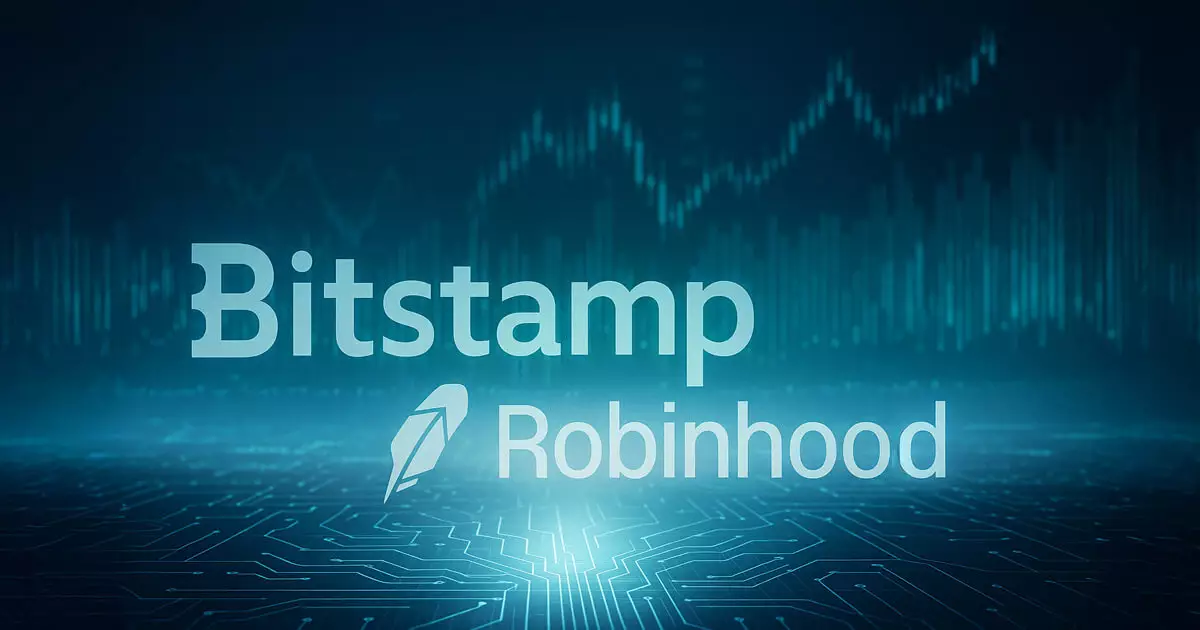The financial landscape is perpetually evolving, especially within the cryptocurrency sector. Robinhood’s recent acquisition of Bitstamp for a staggering $200 million isn’t merely a transaction; it is a calculated gamble that could redefine its market position. By integrating one of the oldest crypto exchanges into its framework, Robinhood has positioned itself to transition from a U.S.-centric platform to a formidable global contender. This acquisition not only reflects confidence in the burgeoning digital currency market but also signifies a profound shift toward expanding institutional offerings—an arena where Robinhood previously had minimal engagement.
CEO Vlad Tenev’s remarks encapsulate the magnitude of this acquisition. With the addition of Bitstamp’s licensing and established reputation, Robinhood is crafting pathways to enter markets that were previously unattainable. The stakes are high, and with this move, Robinhood is not just seeking to garner a larger user base; it’s aiming to redefine how retail investors view crypto trading.
Regulatory Advantages: A Game Changer
Navigating the regulatory landscape in the crypto world can be a labyrinthine affair, often serving as a bottleneck for swift expansion. Robinhood’s acquisition of Bitstamp provides an invaluable shortcut, effectively “passporting” over 50 active licenses across Europe, Asia, and the U.S. This means that rather than spending years obtaining these regulatory approvals, Robinhood can immediately leverage them to operate across 27 EU countries.
In an era where regulatory scrutiny is intensifying, particularly in the U.S., this strategic acquisition represents a smart maneuver. Other competitors, such as Coinbase and Kraken, have opted for more traditional paths to compliance, demonstrating the burdensome nature of seeking licenses independently. Robinhood’s approach indicates a proactive stance in a sector often paralyzed by bureaucratic inertia.
Expanded Product Offerings: Going Beyond Trading
One of the significant advantages of acquiring Bitstamp is the resultant expansion of Robinhood’s product offerings. The addition of over 85 cryptocurrencies, staking capabilities, and lending options provides a rich tapestry from which Robinhood can draw to enhance its platform. Historically, Robinhood has limited its cryptocurrency roster to just 15 tokens available in the U.S. app. This drastic expansion not only signals a diversification strategy but also a desire to attract a more sophisticated clientele.
Moreover, with Bitstamp’s innovative white-label custody solutions and “Bitstamp-as-a-Service” offerings, Robinhood is now positioned to tap into the institutional revenue segment. In an increasingly competitive landscape where retail trading commissions are under pressure, diversifying income sources becomes paramount for sustainable growth. This move may well signify a shift in the fundamental business model of Robinhood, steering it towards a more resilient and diversified profit base.
Institutional Appeal: Attracting Serious Investors
Perhaps one of the most noteworthy aspects of this acquisition is its potential to draw institutional investors. Historically, Robinhood has piqued the interest of retail traders, but with the advent of Bitstamp, it finds itself with a robust entry point into high-frequency trading and family office markets. Roughly a quarter of Bitstamp’s trading volumes stem from institutional clients—a ‘stickier’ revenue stream compared to retail trading.
This shift isn’t merely about numbers; it’s about credibility. By absorbing Bitstamp’s established portfolio, Robinhood sends a strong message to skeptics that it is ready to cater to a more sophisticated audience. Persuading traditional financial institutions to enter the crypto space through Robinhood could very well change the narrative around digital currencies and their integration into mainstream finance.
The Future: Challenges Ahead
As Robinhood sets its sights on integrating Bitstamp’s operations, challenges lying ahead are as daunting as they are exciting. Convincing both loyal Bitstamp customers and Robinhood enthusiasts that this merger will result in a seamless, improved experience is a significant test. The crypto community is notoriously skeptical, particularly in the face of major changes that could disrupt their established routines.
In a rapidly evolving industry, maintaining transparency and trust is paramount. Should Robinhood successfully navigate the integration while delivering on promises, it will not just have enhanced its offerings; it may very well become an established titan in the global cryptocurrency landscape. However, the road is fraught with pitfalls, and the stakes couldn’t be higher.

